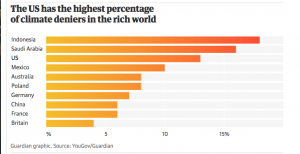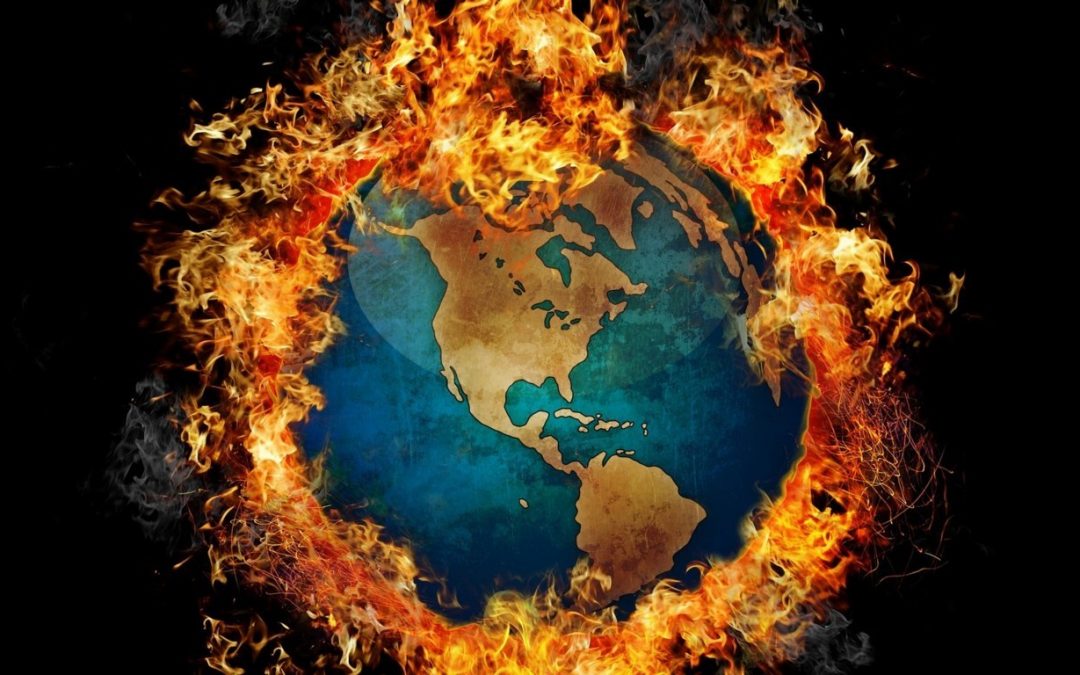By Ray Williams
July 19, 2020

Capitalism is facing at least three major crises. A pandemic-induced health crisis has rapidly ignited an economic crisis with yet unknown consequences for financial stability, and all of this is playing out against the backdrop of a climate crisis that cannot be addressed by “business as usual.”
This triple crisis has revealed several problems with how we do capitalism, all of which must be solved at the same time that we address the immediate health emergency. Otherwise, we will simply be solving problems in one place while creating new ones elsewhere. That is what happened with the 2008 financial crisis. Policymakers flooded the world with liquidity without directing it toward good investment opportunities. As a result, the money ended up back in a financial sector that does little to help the economic well-being of the general population.
We have now reached a point in the twenty-first century in which the externalities of the capitalist system, such as the costs of war, the depletion of natural resources, the waste of human lives, the inability to marshal resources efficient to meet the pandemic and the disruption of the planetary environment, now far exceed any future economic benefits that capitalism offers to society as a whole. The accumulation of capital and the amassing of wealth are increasingly occurring at the expense of an irrevocable rift in the social and environmental conditions governing human life on earth.
Less than two decades into the twenty-first century, it is evident that capitalism has failed as a social system. The world is mired in economic stagnation, financialization, and the most extreme inequality in human history, accompanied by mass unemployment and underemployment, precariousness, poverty, hunger, wasted output and lives, and what at this point can only be called a planetary ecological “death spiral.”
Capitalism as we know it is over. So suggests a new report commissioned by a group of scientists appointed by the UN Secretary-General. The main reason? We’re transitioning rapidly to a radically different global economy, due to our increasingly unsustainable exploitation of the planet’s environmental resources.
Climate change today is bordering on catastrophic. A recent UN study found that we haveless than a decade to make changes in our footprint in order to avoid a 1.5 degree Celsius change, the mark that they say would be disastrous and irreversible. If we do not make these changes, changes on a scale never before seen in our species, the world will never be the same, and will likely be uninhabitable for us in the near future.

While climate change is the symptom, capitalism is the cause; 100 companies are responsible for 70% of all carbon emissions. Clearly allowing companies the freedom to pursue profit at any cost is unsustainable and dangerous. There is no way for the planet to survive or our species to thrive while profit continues to take priority over the environment and the future.
Despite these new shocking findings about our impending doom, we have shown no signs of changing. For anyone who wants to live on a planet free of constant droughts, wildfires, floods, hurricanes, and tornadoes, with animals in the wild and in the sea and air, this is the most terrifying news. If you, like me, want to have kids one day that can live a life even remotely as nice as ours, or really any life at all, this news is crushing. Things simply have to change.
Climate change and species extinctions are accelerating even as societies are experiencing rising inequality, unemployment, slow economic growth, rising debt levels, and impotent governments. Contrary to the way policymakers usually think about these problems, the new report says that these are not really separate crises at all.
Rather, these crises are part of the same fundamental transition to a new era characterized by inefficient fossil fuel production and the escalating costs of climate change. Conventional capitalist economic thinking can no longer explain, predict, or solve the workings of the global economy in this new age, the paper says.Those are the stark implications of a new scientific background report prepared by a team of Finnish biophysicists. The team from the BIOS Research Unit in Finland were asked to provide research that would feed into the drafting of the UN Global Sustainable Development Report (GSDR), released in 2019.
For the “first time in human history,” this report says, capitalist economies are “shifting to energy sources that are less energy efficient.” This applies to all forms of energy. Producing usable energy (“exergy”) to keep powering “both basic and non-basic human activities” in industrial civilization “will require more, not less, effort; economies have used up the capacity of planetary ecosystems to handle the waste generated by energy and material use, ” the report says.
This report states that the amount of energy we can extract, compared to the energy we are using to extract it, is decreasing “across the spectrum—unconventional oils, nuclear and renewables return less energy in generation than conventional oils, whose production has peaked—and societies need to abandon fossil fuels because of their impact on the climate.”
The shift to renewables might help solve the climate challenge, but for the foreseeable future will not generate the same levels of energy as cheap, conventional oil.
In the meantime, our hunger for energy is driving what the report refers to as “sink costs.” The greater our energy and material use, the more waste we generate, and so the greater the environmental costs. Though they can be ignored for a while, eventually those environmental costs translate directly into economic costs as it becomes more difficult to ignore their impacts on our societies.
And the biggest “sink cost,” of course, is climate change:“Sink costs are also rising; economies have used up the capacity of planetary ecosystems to handle the waste generated by energy and material use. Climate change is the most pronounced sink cost,” the report states.
The report’s lead author, Dr. Paavo Järvensivu, is a “biophysical economist”—an emerging type of economist exploring the role of energy and materials in fuelling economic activity.
The BIOS report suggests that much of the political and economic volatility we have seen in recent years has a root cause in ecological crisis. As the ecological and economic costs of industrial overconsumption continue to rise, the constant economic growth we have become accustomed to is now in jeopardy. That, in turn, has exerted massive strain on our politics.
But the underlying issues are still unacknowledged and unrecognized by most policymakers.
The scientists who authored the report refer to the pioneering work of systems ecologist Professor Charles Hall of the State University of New York and economist Professor Kent Klitgaard from Wells College. Earlier this year, Hall and Klitgaard released an updated edition of their seminal book, Energy and the Wealth of Nations: An Introduction to BioPhysical Economics.
Hall and Klitgaard are highly critical of mainstream capitalist economic theory, which they say has become divorced from some of the most fundamental principles of science. They refer to the concept of ‘Energy Return on Investment’ (EROI) as a key indicator of the shift into a new age of difficult energy. EROI is a simple ratio that measures how much energy we use to extract more energy.
“For the last century, all we had to do was to pump more and more oil out of the ground,” say Hall and Klitgaard. Decades ago, fossil fuels had very high EROI values—a little bit of energy allowed us to extract large amounts of oil, gas and coal.
Now we’re using more and more energy to extract smaller quantities of fossil fuels. This means higher production costs to produce what we need to keep the economy rolling. The stuff is still there in the ground—billions of barrels worth to be sure, easily enough to fry the climate several times over.
“We face a form of capitalism that has hardened its focus to short-term profit maximization with little or no apparent interest in social good, ” Hall and Klitgaard argue.

In August, 2019, billionaire investor Jeremy Grantham—who has a track record of consistently calling financial bubbles released a new paper, “The Race of Our Lives Revisited,” which provides a bruising indictment of contemporary capitalism’s complicity in the ecological crisis. Grantham’s verdict is that “capitalism and mainstream economics simply cannot deal with the systematic depletion of planetary ecosystems and environmental resources.
Capitalism has generated massive wealth for some, but it’s devastated the planet and has failed to improve human well-being at scale:
- Species are going extinct at a rate 1,000 times faster than that of the natural rate over the previous 65 million years (see Center for Health and the Global Environment at Harvard Medical School).
- Since 2000, 6 million hectares of primary forest have been lost each year. That’s 14,826,322 acres, or just less than the entire state of West Virginia (see the 2010 assessment by the Food and Agricultural Organization of the UN).
Professors Christopher Wright and Daniel Nyberg published Climate Change, Capitalism and Corporationslast fall, arguing that businesses are locked in a cycle of exploiting the world’s resources in ever more creative ways. “Our book shows how large corporations are able to continue engaging in increasingly environmentally exploitative behavior by obscuring the link between endless economic growth and worsening environmental destruction,” they wrote.
Corporate capitalism is committed to the relentless pursuit of growth, even if it ravages the planet and threatens human health, they say.
David Suzuki, an award-winning geneticist and broadcaster, co-founded the David Suzuki Foundation in 1990; he is professor emeritus at the University of British Columbia, and is widely recognized as a world leader in sustainable ecology and has received numerous awards for his work, including a UNESCO prize for science and a United Nations Environment Program medal has raised alarm about the convergence of crises.
Suzuki writes :“Recent research confirms what we’ve known for some time: Destruction of natural spaces, intensification of agriculture and livestock production and the unsustainable wildlife trade are driving the spread of diseases from non-human animals to people—known as ‘zoonotic’ transmission.”
We’re at a turning point says Suzuki: “ We can go back to a “normal” existence beset by pollution, climate chaos, disease, racism and massive inequality, or we can take this opportunity to reset. Marginalized people face greater risks from climate change and environmental damage, in part because industrial development is often situated near remote, vulnerable communities, and because they often don’t have the resources to protect themselves. Research also shows Covid-19 is especially hard on Black, Indigenous and other people of color, as well as the poor.”
In her book,This Changes Everything: Capitalism Versus the Climate. Environmental activist Naomi Klein has exposed how sociopathic carbon-mining companies are laying waste to the biosphere and the future prospects of human society.
In her landmark work The Origin of Capitalism, Ellen Meiksens Wood argues that capitalism creates the conditions for fossil fuel exploitation. Capitalist markets, like all economic systems, turn on the necessity of using economic tools to extract surplus. This dynamic creates capitalism’s drives to reinvest in productivity growth and to discipline the workforce in order to increase output.
If present climate-change trends continue, the “global carbon budget” associated with a 2°C increase in average global temperature will be broken in sixteen years (while a 1.5°C increase in global average temperature—staying beneath which is the key to long-term stabilization of the climate—will be reached in a decade). Earth System scientists warn that the world is now perilously close to a Hothouse Earth, in which catastrophic climate change will be locked in and irreversible.

The ecological, social, and economic costs to humanity of continuing to increase carbon emissions by 2.0 percent a year as in recent decades (rising in 2018 by 2.7 percent—3.4 percent in the United States), and failing to meet the minimal 3.0 percent annual reductions in emissions currently needed to avoid a catastrophic destabilization of the earth’s energy balance, are simply incalculable.
Nevertheless, major energy corporations continue to lie about climate change, promoting and bankrolling climate denialism—while admitting the truth in their internal documents. These corporations are working to accelerate the extraction and production of fossil fuels, including the dirtiest, most greenhouse gas-generating varieties, reaping enormous profits in the process. The melting of the Arctic ice from global warming is seen by capital as a new El Dorado, opening up massive additional oil and gas reserves to be exploited without regard to the consequences for the earth’s climate.
In response to scientific reports on climate change, Exxon Mobil declared that it intends to extract and sell all of the fossil-fuel reserves at its disposal. Energy corporations continue to intervene in climate negotiations to ensure that any agreements to limit carbon emissions are defanged. Capitalist countries across the board are putting the accumulation of wealth for a few above combatting climate destabilization, threatening the very future of humanity.
To avoid catastrophic climate change, many economists argue we have to break the expansionary cycle of the economy. Otherwise technological improvements, renewable energy, and energy efficiency gains will do nothing but add to the stock of ways that capitalists grow the economy and their profits. Also carbon taxes and other market mechanisms will simply reinforce the core dynamics of the market and any positive effects will be overwhelmed by growth. Growth will increase energy use, including fossil fuel use.
We all can and should do our part—fly less if possible, buy local foods that haven’t been shipped thousands of miles, get solar panels and an electric car. But let’s not lose sight of the root cause of this crisis: rampant capitalism. Capitalism has steamrolled this planet and its organisms, gouging out mountains, overexploiting fish stocks, and burning fossil fuels to power the maniacal pursuit of growth and enrich a fraction of humanity.

Most of us have probably heard of the Anthropocene, humanity’s stain on the geological record through activities like land misuse and plastic pollution. Jason Moore, an environmental historian and sociologist at Binghamton University, calls the problem something else: The “Capitalocene.” Moore argues thatclimate changes over the past 2,000 years have been extraordinarily destabilizing to ruling classes. This was the case for the Roman Empire in the West.
So drought pushes the Huns, which pushed the Goths, and they go into Western Europe. But more fundamentally, the changing climate after the year 400 creates all sorts of economic and political tensions, and in Western Europe the Roman Empire collapses.
Moore says, “Capitalism is not going to survive, but it also depends on what we mean by capitalism. For me, Capitalocene is a critique of this idea that capitalism is just about economics. Because it’s also a system of power and it’s a system of culture. A difference this time with human-made climate change compared with past realignments of power is that capitalism has wrapped around the world.”
“You have all these economically interconnected countries.It’s interconnectedness in an imperial sense in terms of great powers, but also in terms of the overwhelming power of finance capital, which is of course kept afloat by the great powers. I think that it makes the global system much more volatile and much more vulnerable. In places like Dubai and Miami, they’re already getting skittish. What happens when Miami has storm surges of 3 or 4 feet every year? What happens when Manhattan experiences a super storm Sandy kind of reality every couple of years?”
Moore contends with all seriousness: “Ending climate change requires the end of capitalism. Have we got the stomach for it? Policy tweaks won’t do it, we need to throw the kitchen sink at this with a total rethink of our relationship to ownership, work and capital.”
Meanwhile public concern toward climate change in the US is notincreasing, and it receives relatively little coverage in the news compared to other social issues. A 2007 Harris poll found that 71 percent of Americans believed that the continued burning of fossil fuels would cause the climate to change. By 2009 the figure had dropped to 51 percent. In June 2011 the number of Americans who agreed was down to 44 percent—well under half the population. According to Scott Keeter, director of survey research at the Pew Research Center for People and the Press, this is “among the largest shifts over a short period of time seen in recent public opinion history.”
And politicians and business leaders in the US and Canada have framed climate change in an either/or proposition—either you are in favor of economic growth and prosperity that comes with fossil fuel exploitation, or you are against it by embracing radical climate change strategies such as the abandonment of fossil fuels.
Meanwhile, the fossil fuel industry is rushing to make multibillion-dollar investments in new infrastructure to extract oil, natural gas and coal from some of the dirtiest and highest-risk sources on the continent (the $7 billion Keystone XL pipeline being only the highest-profile example). In the Alberta tar sands, in the Artic’s Beaufort Sea, in the gas fields of Pennsylvania and the coalfields of Wyoming and Montana, the industry is betting big that the climate movement is as good as dead.
A key piece of reconceptualizing our economy we must undertake involves the rapid re-regulation of the corporate sector. Much can be done with incentives: Subsidies for renewable energy and responsible land stewardship, for instance. But we are also going to have to get back into the habit of barring outright dangerous and destructive behavior.
That means getting in the way of corporations on multiple fronts, from imposing strict caps on the amount of carbon corporations can emit, to banning new coal-fired power plants, to cracking down on industrial feedlots, to shutting down dirty-energy extraction projects like the Alberta tar sands (starting with pipelines like Keystone XL that lock in expansion plans).
This growth imperative is why conventional economists reliably approach the climate crisis by asking the question, How can we reduce emissions while maintaining robust GDP growth? The usual answer is “decoupling”—the idea that renewable energy and greater efficiencies will allow us to sever economic growth from its environmental impact.
And “green growth” advocates like Thomas Friedman tell us that the process of developing new green technologies and installing green infrastructure can provide a huge economic boost, sending GDP soaring and generating the wealth needed to “make America healthier, richer, more innovative, more productive, and more secure.”
But here is where things get complicated. There is a growing body of economic research on the conflict between economic growth and sound climate policy, led by ecological economist Herman Daly at the University of Maryland, as well as Peter Victor at York University, Tim Jackson of the University of Surrey and environmental law and policy expert Gus Speth.
All raise serious questions about the feasibility of industrialized countries meeting the deep emissions cuts demanded by science (at least 80 percent below 1990 levels by 2050) while continuing to grow their economies at even today’s sluggish rates. As Victor and Jackson argue, greater efficiencies simply cannot keep up with the pace of growth, in part because greater efficiency is almost always accompanied by more consumption, reducing or even canceling out the gains (often called the “Jevons Paradox”).
And so long as the savings resulting from greater energy and material efficiencies are simply plowed back into further exponential expansion of the economy, reduction in total emissions will be thwarted. As Jackson argues in Prosperity Without Growth, “Those who promote decoupling as an escape route from the dilemma of growth need to take a closer look at the historical evidence—and at the basic arithmetic of growth.”
The bottom line is that an ecological crisis that has its roots in the overconsumption of natural resources must be addressed not just by improving the efficiency of our economies but by reducing the amount of material stuff we produce and consume. Yet that idea is anathema to the large corporations that dominate the global economy, which are controlled by footloose investors who demand ever greater profits year after year. We are therefore caught in the untenable bind of, as Jackson puts it, “trash the system or crash the planet.”
Just as tobacco companies have been obliged to pay the costs of helping people to quit smoking, and BP has had to pay for the cleanup in the Gulf of Mexico, it is high time for the “polluter pays” principle to be applied to climate change. Beyond higher taxes on polluters, governments will have to negotiate much higher royalty rates so that less fossil fuel extraction would raise more public revenue to pay for the shift to our post-carbon future (as well as the steep costs of climate change already upon us). Since corporations can be counted on to resist any new rules that cut into their profits, nationalization—the greatest free-market taboo of all—cannot be off the table.
Responding to climate change requires that we break every rule in the free-market playbook and that we do so with great urgency. We will need to rebuild the public sphere, reverse privatizations, “relocalize” large parts of economies, scale back overconsumption, bring back long-term planning, heavily regulate and tax corporations, maybe even nationalize some of them, cut military spending and recognize our debts to the developing countries that capitalism has exploited.
Of course, none of this has a hope in hell of happening unless it is accompanied by a massive, broad-based effort to radically reduce the influence that corporations have over the political process. That means, at a minimum, publicly funded elections and stripping corporations of their status as “people” under the law. In short, climate change supercharges the pre-existing case for virtually every progressive demand on the books, binding them into a coherent agenda based on a clear scientific imperative.
Copyright: Neither this article or a portion thereof may be reproduced in any print or media format without the express permission of the author.
Read my latest book: I Know Myself And Neither Do You: Why Charisma, Confidence and Pedigree Won’t Take You Where You Want To Go, available in paperback and ebook formats on Amazon and Barnes and Noble world-wide.


